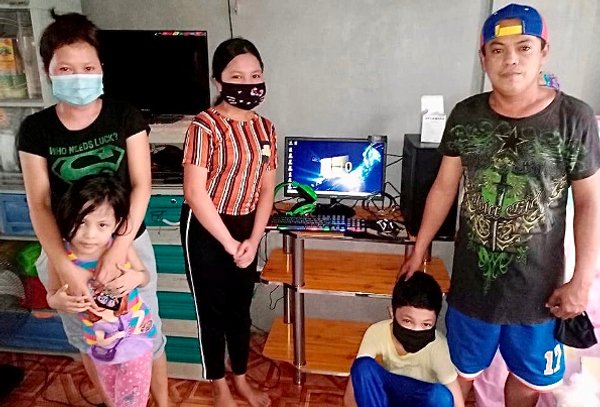Fourteen-year-old Meriam Peligro is a member of the Kabataan Girls Club, an outreach program for disadvantaged adolescents run by women volunteers from the Opus Dei center in Las Piñas, south of Manila. Kabataan’s objective is to shape public high school girls into women of God, courage, truth, virtue and duty.
“This is our contribution to upholding a morally upright society,” says Program Director Dorothy Claro. “The girls undergo a four-year program of leadership training and outside-the-classroom learning to help instill in them the right values and give them a competitive edge in tomorrow’s workforce,” Claro said.

When the coronavirus broke out in March, Meriam’s father lost his job, which plunged the family into debt. Unable to see more than a day into the future, Meriam prayed unceasingly and lived out the fortitude she learned from the Kabataan Club (Kabataan is the Filipino word for “youth”).
The eldest of four children, Meriam aspires to liberate her family from poverty. She envisions herself as an accomplished chef and a major contributor to the household income. For Meriam and many others coming from less privileged families, a four-year college course is out of reach. High school graduates often find no options leading to a successful future. Through its contacts, the Kabataan Club offers deserving high school graduates scholarships for a two-year course in culinary arts that leads immediately to a guaranteed job.
Grade 9 student Michaella Joy Hernandez, another Kabataan Club member, comes from a family of three children. In her first year attending the Club activities, Michaella’s parents were afraid that her involvement would detract from her academic focus. Schoolwork and household chores were aplenty, and three hours a week spent in Kabataan seemed too much.

Michaella was determined and has become an outstanding student and leader. “Through the outside-the-classroom activities of Kabataan Club I discovered myself, grew in self confidence and developed my critical thinking, communication skills, and soft skills,” she said.
Michaella’s father makes a living by renting a tricycle (a motorcycle with a passenger side car). On a typical day, he nets PHP300 (USD6). In mid-March, Michaella’s father was forced off the road when the government imposed a two-month lockdown to contain the spread of COVID-19. The household struggled financially, and their cupboards went empty. Having suffered evictions in the past, Michaella feared most the prospect of being forced out of their home again for failure to pay rent. That fear made Michaella relentless in her determination to one day provide the family a house of their own.
Through its mentoring program, the Club prioritizes strengthening the spirit and character of its members, but the deep social inequities highlighted by the pandemic impelled the Kabataan women volunteers, at this time, to seek funds to provide for the girls’ urgent basic needs.
Given the severe restrictions on public movement, the safest response was by contactless money remittance. The volunteers fast-tracked their digital literacy skills, particularly learning mobile wallet technology. They taught the girls how to open e-wallet accounts, and funds were directly transferred for their needs.

Tech muscles flexed, the volunteers also turned the Kabataan catechism and leadership classes into online events. Before each session, they would send the girls prepaid electronic load to enable them to join the online meeting. Members with no smartphones and with poor Internet connection were provided a basic phone and a plug-and-play Wi-Fi device to boost their connectivity. As volunteer facilitators familiarized themselves with the technical features of Zoom, online presentations became increasingly sophisticated and interactive.
The bigger challenge for the Club was the crippling blow that COVID-19 dealt to public education in the Philippines as a whole. Numerous students from low-income families are facing exclusion due to the lack of Internet access and gadgets for online learning. To address this, Kabataan volunteers sought donations for computers and tablets to support the distance learning of the public school girls.
Thanks to the generosity of donors from various parts of the world, by the start of the present schoolyear in October, each of the Club members received either a desktop computer or a tablet.

Michaella received a brand new desktop computer. Overcome with joy, she wrote to the donor, Cedi, who himself worked his way out of poverty: “Kuya Cedi, you have given me a great help. Because of this computer, my siblings and I will no longer have a hard time keeping up with online classes this year. I want you to know that I will not waste the help you have given me. I will improve in my studies. I also want to prove to all that even if life is hard, I will not give up, so that I also may have a good future.”
“Our job is to keep the lamps burning as a glimmering beacon of hope to our members,” said Claro, the Program Director of Kabataan.
Imbued with the right values, virtues and skills, young students like Meriam and Michaella meet everyday challenges with their eyes on the goal of breaking the cycle of inherited poverty.
